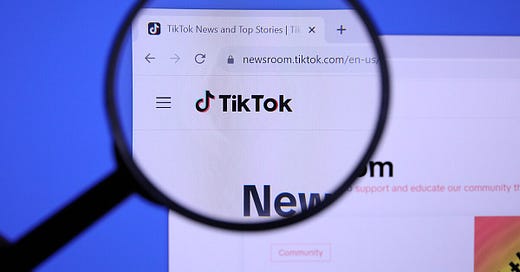TikTok Likely Has Obscure Constitutional Trump Card
Bills of Attainder Clause Is Serious Obstacle To House Bill

TikTok users concerned that Congress may ban the app may be able to relax, at least for now.
The House bill, passed yesterday, is likely a bill of attainder, an obscure type of law the Constitution specifically prohibits. As the Supreme Court explained in 1977:
In England a bill of attainder originally connoted a parliamentary Act sentencing a named individual or identifiable members of a group to death. [The Constitution], however, also proscribes enactments originally characterized as bills of pains and penalties, that is, legislative Acts inflicting punishment other than execution. Generally addressed to persons considered disloyal to the Crown or State, “pains and penalties” historically consisted of a wide array of punishments: commonly included were imprisonment, banishment, and the punitive confiscation of property by the sovereign. Our country's own experience with bills of attainder resulted in the addition of another sanction to the list of impermissible legislative punishments: a legislative enactment barring designated individuals or groups from participation in specified employments or vocations, a mode of punishment commonly employed against those legislatively branded as disloyal.
The Court’s key words include “named individual or identifiable members of a group,” “disloyal,” “banishment,” “confiscation” and “specified employments or vocations.” The following list addresses each in order:
“Named individual or identifiable members of a group”—the opening sentence of the House bill specifically targets “TikTok and any successor application or service and any other application or service developed or provided by ByteDance Ltd. or an entity under the control of ByteDance Ltd.” The Bill later repeats this specific enumeration of “ByteDance, Ltd.” and “TikTok.”
“Disloyal”—the House bill uses the phrase “foreign adversary” 32 times.
“Banishment”—the House bill expressly invokes “the land or maritime borders of the United States,” effectively banishing TikTok.
“Confiscation”—the House bill leaves “divestiture” as TikTok’s only way forward and provides TikTok no guarantee of “just compensation,” as required by the Fifth Amendment whenever the government takes “private property.”
“Specified employments or vocations”—the House bill five times uses the phrase “website, desktop application, mobile application, or augmented or immersive technology application” to describe exactly the means of employment or vocation denied to disloyal “foreign adversaries.”
What is more, the current Supreme Court majority is likelier than any other in the last century to apply a strict, historical (“textualist”) interpretation of the Constitution’s Bills of Attainder Clause favorable to TikTok. That is not to say that the bill would make it that far in litigation. The government’s last attempt to ban TikTok never made it out of the trial court.
TikTok, however, may yet face serious legal challenges. Legislation with criminal sanctions to regulate TikTok’s data practices is constitutionally feasible. Congress could require, e.g., that TikTok house U.S. residents’ data domestically and receive regulatory permission to export that data or allow foreign access to it.
Multiple Justice Department attorneys have described Martin MartyG Gottesfeld as “a sophisticated pro se litigant.” Federal Judge Nathanial M. Gorton ordered Gottesfeld, over Gottesfeld’s objection, to represent himself in a federal criminal case.




Buy stock!!!